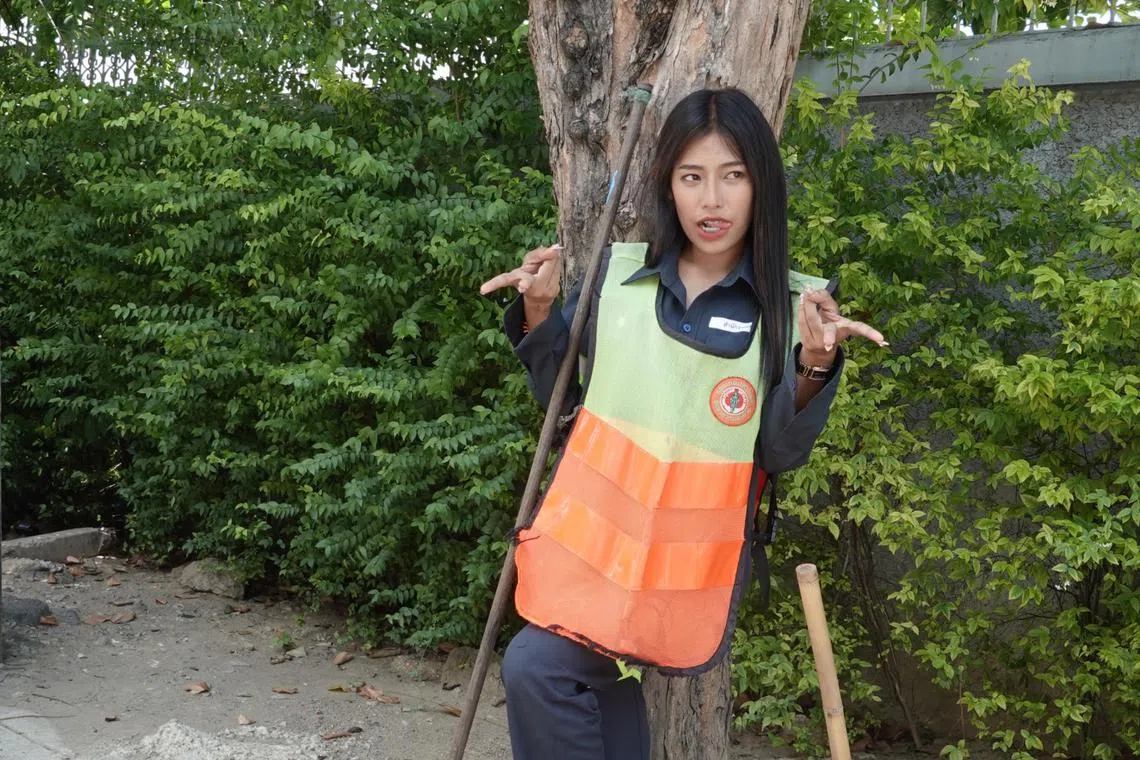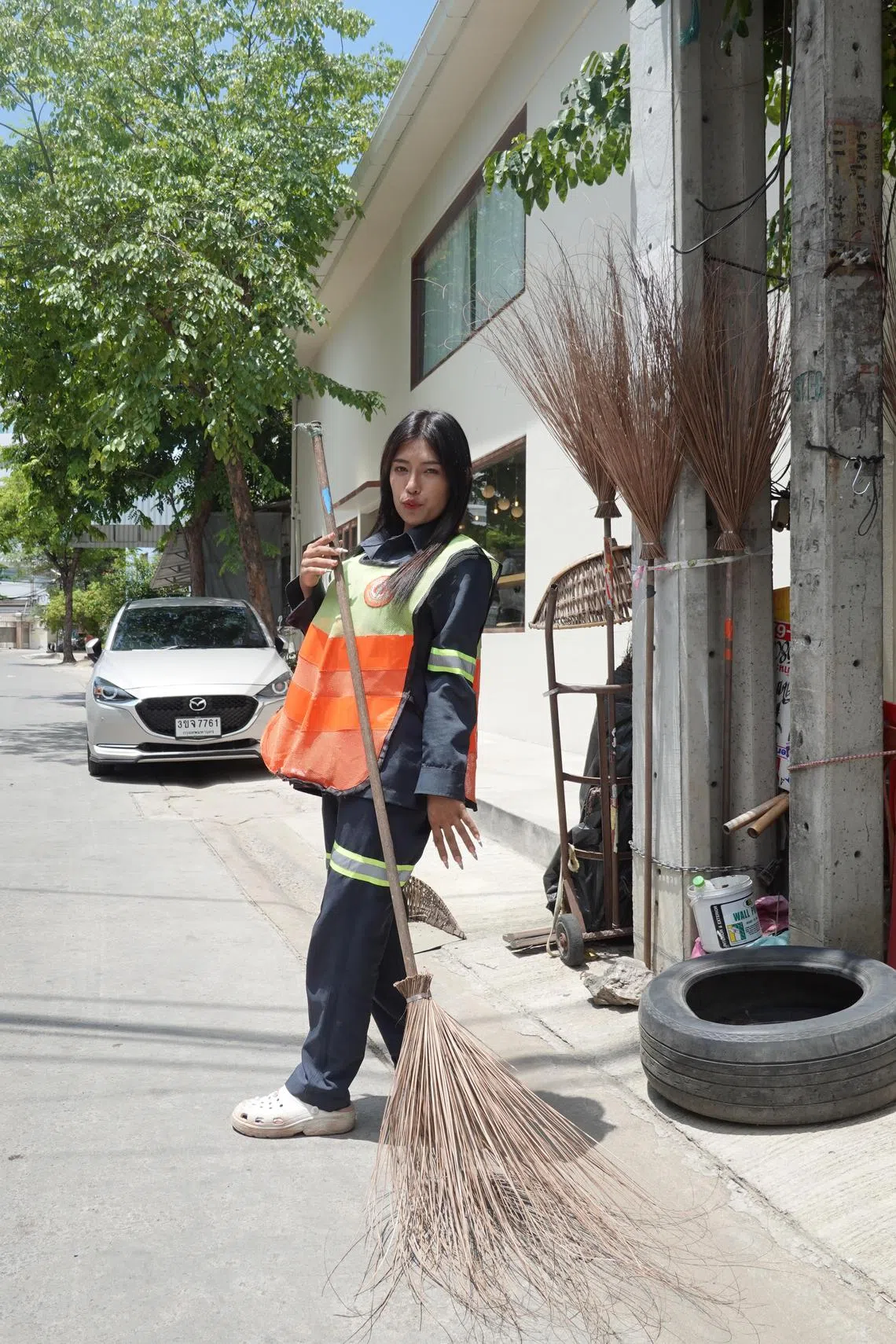Thailand’s ‘most beautiful’ road sweeper brushes off criticism and defies stereotypes
Sign up now: Get insights on Asia's fast-moving developments

Ms Pattaramon Thocharoen's videos are often lighthearted, showing her dancing or reacting to encounters in her day-to-day work.
ST PHOTO: TAN TAM MEI
BANGKOK - Whether she is perched in the back of a water truck, gingerly plucking weeds with her manicured nails or staring down a stray dog on the streets, Ms Pattaramon Thocharoen is always camera-ready with a full face of make-up and several poses.
Also known as “Bow”, the 27-year-old has an image to upkeep with over 300,000 TikTok followers, some of whom have dubbed her Thailand’s “most beautiful street sweeper”.
“People have criticised me for wearing make-up in my profession, but why can’t I look pretty while doing hard work? It’s for my own satisfaction,” the mother of two sons, aged nine and six, told The Straits Times.
Ms Pattaramon’s videos are often light-hearted, showing her dancing or reacting to unusual or funny encounters in her day-to-day work – for example, hunting for her missing broom, or touching up her make-up excitedly after learning that she will be stationed near an army camp for the day.
She shot to fame in the past year for the short video clips she posts on TikTok, and is famous for one video in particular where she rants about an older woman who criticised her for dolling up because Ms Pattaramon was “just a street sweeper”.
“So I said, the goal of (my) life is to be beautiful... We have to make ourselves as happy as possible,” said Ms Pattaramon in the clip that has had over 3.7 million views.
“This was the profession that my parents did to raise me, so I’m proud of it,” said Ms Pattaramon, whose mother was a street sweeper and father a garbage truck driver. Both are retired.
The contrast between her daily tasks, which include collecting rubbish and scrubbing the asphalt, and her glamorous appearance is somewhat stark. But this has allowed her to grow not just her following, but her wages as well.
She earns about 12,000 baht (S$460) a month as a street cleaner in the Chom Thong district under the Bangkok Metropolitan Authority. But she can bring in 50,000 baht a month from her social media engagements, such as brand reviews, product sales and virtual TikTok Gifts, which are given by followers and can be converted to cash.
“Now I’m more financially stable. I’m able to spend more on small things like choosing express delivery when shopping online or having nice meals with my family,” said Ms Pattaramon, who lives in Bangkok with 10 other family members, including her children and parents.
With the rise of what some experts term “working-class” influencers, low-wage earners like Ms Pattaramon have found an avenue to supplement their earnings by giving others a peek into their daily lives on social media.
This emerging group of content creators includes farmers, bus conductors and electricians working on Thailand’s infamous entangled network of overhead power lines, and are a far cry from the role typically associated with wealthy, already-famous or well-connected individuals.
Several digital marketing agencies such as Platform Group have picked up on the rising trend of the “blue-collar” or “ordinary” influencer. The agency currently manages about 500 such content creators, which include housewives, security officers, teachers and factory workers, spread across Thai cities and the countryside.
While there are no official figures on the number of blue-collar influencers, Platform Group’s chief executive officer Poiluang Konsongsaen estimates that their numbers have more than doubled in the last three years.
“Many of them don’t set out to be influencers. Some might be posting mundane content of themselves at work or cooking at home. But it’s the small things like them speaking in the local dialect, or coming from a similar background, that allow their content to resonate with the majority of people,” he said.
This is not a trend unique to Thailand. Globally, the increased access to digital devices and the Internet as well as the social isolation during the pandemic have fuelled a significant growth in social media usage.
TikTok in particular, is popular in Thailand, partly driven by the nation’s high rate of phone ownership, as well as Internet penetration that is among the top in the region.
The platform’s format, in particular, makes it easy for anyone to use, said Dr Poiluang. “My housekeeper uses it and creates her own videos.”
Over 80 per cent of Thailand’s 70 million population are reportedly frequent social media users.
According to various estimates, there are 41 million active TikTok users in Thailand.
Influencers from the working-class or minority backgrounds are breaking the mould and defying stereotypes, said social analyst Daniel McFarlane, a digital economy lecturer at Thammasat University’s School of Global Studies.
“Working-class influencers on TikTok and other platforms are driving an important change in the communication ecosystem. They are showing there is value in giving voice to rural and working-class people, as well as marginalised or minority groups.”
The rise of such blue-collar influencers does not just stem from the pandemic restrictions where people had more time to consume such content, but also from the desire to engage with “real” people, said Associate Professor Peerayuth Charoensukmongkol, who researches social media behaviour at the International College of National Institute of Development Administration.
“For some, it’s like watching a reality show, the true life of working-class people. Some might engage with it positively where they identity with it, or negatively, where the wealthy are curious to see what those in other classes of society do,” he said.
Data collected by Platform Group showed that the segment of working-class or rural influencers tends to do better in marketing campaigns targeted at specific regions or socio-economic groups in Thailand. For example, having a creator who speaks the local dialect for a regional campaign can increase engagement levels by more than 70 per cent, said Dr Poiluang.
“There is value in presenting the diverse nature of content creators, and it’s also changing the dialogue of what’s considered cool or not cool in society,” he said.

Ms Pattaramon Thocharoen now has over 300,000 TikTok followers.
PHOTOS: PATTARAMON THOCHAROE/TIKTOK
Giving a platform to those like Ms Pattaramon, whose voices are often ignored in traditional media and society, is definitely a positive outcome of this phenomenon, said social media analysts, and this also gives those earning low wages an opportunity to bridge the income inequality gap.
“Social media can make people more equal, no matter who you are. If you can make interesting content, at little or no cost at all, you can rise above the minimum wage,” said Dr Peerayuth.
The minimum daily wage in Thailand ranges from about 320 baht to 350 baht.
Still, there are many wannabe influencers who fail, and experts are reluctant to suggest it as a viable or sustainable career path for people from any socio-economic background.
While being a social media influencer has helped individuals like Ms Pattaramon find alternative sources of income, it is definitely not a panacea for poverty or widening social and income inequalities in Thailand, said Dr McFarlane. “On an individual level, it can certainly provide some social mobility for those who are successful. But on a societal level, it is not enough to successfully address income inequality.”
Despite the monthly manicures and hours spent on her appearance, Ms Pattaramon knows her TikTok fame will not last forever. That is why she tries to save most of her extra income for her children. “I don’t let the popularity get to my head because one day it could all disappear,” she said.

Ms Pattaramon Thocharoen has shot to fame in the last year for the short video clips she posts on TikTok.
ST PHOTO: TAN TAM MEI
Beyond the extra earnings, Ms Pattaramon says her online fame has given her a platform to engage with people from various backgrounds and share her thoughts with society.
“Many people assume that those in my profession don’t have thoughts or attitudes to express about life, but we do.”
But she does not see herself as an influencer. “I want people to see me as a street sweeper who likes to do TikTok videos,” said Ms Pattaramon, adding that she gets positive feedback from viewers who like the way she approaches her job and her critics.
“If I can spread positivity while doing my job and looking good, why not?”



